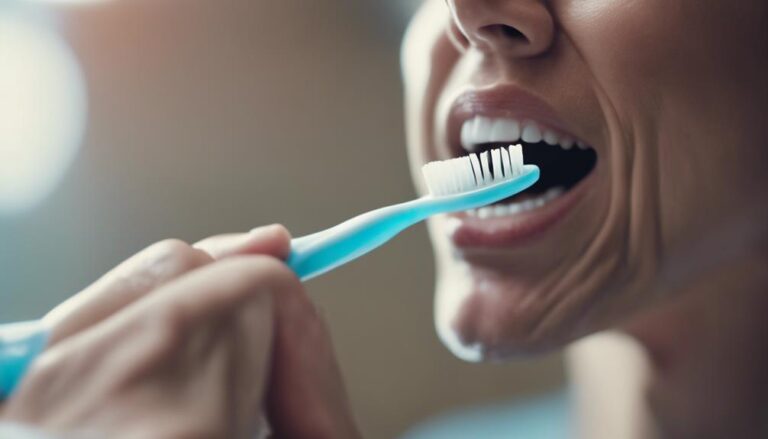Experiencing persistent bad breath? Gum disease can play a significant role. Neglected oral hygiene allows harmful bacteria to flourish, causing malodor and gum inflammation. Regularly brushing with fluoride toothpaste, flossing, and using an antimicrobial mouthwash can help restore a healthy bacterial balance and prevent bacterial overgrowth. Don’t forget to schedule dental cleanings to remove stubborn plaque and maintain peak oral health. Discover how gum inflammation, pockets forming odor-causing bacteria, plaque accumulation, and gum disease progression can all contribute to halitosis.
Key Takeaways
- Bacterial overgrowth in pockets causes foul breath.
- Gum disease allows harmful bacteria to flourish.
- Plaque buildup releases odor-causing compounds.
- Inflammation from gum disease contributes to bad breath.
- Neglecting oral hygiene leads to halitosis progression.
Bacterial Buildup and Halitosis
Battling persistent bad breath due to bacterial buildup is a common concern for individuals with gum disease. Maintaining good oral hygiene is essential in preventing the overgrowth of bacteria in the mouth and restoring a healthy bacterial balance. When oral hygiene practices such as regular brushing, flossing, and dental check-ups are neglected, harmful bacteria can thrive, leading to gum disease and malodor.
To combat bacterial buildup and halitosis, it’s important to prioritize oral hygiene. Brushing teeth at least twice a day with fluoride toothpaste, flossing daily, and using an antimicrobial mouthwash can help remove plaque and prevent the accumulation of bacteria in the mouth. Additionally, scheduling regular dental cleanings is crucial for removing hardened plaque (tartar) that can’t be removed through regular brushing and flossing.
Maintaining a healthy bacterial balance in the mouth is key to preventing gum disease and bad breath. By practicing good oral hygiene habits and seeking professional dental care, individuals can effectively manage bacterial buildup and halitosis, promoting overall oral health and well-being.
Gum Inflammation and Malodor
Gum inflammation, along with its associated malodor, is a common consequence of bacterial overgrowth in the oral cavity. When gums become inflamed, the delicate tissues swell and become more prone to bleeding, creating an environment where bacteria thrive and release foul-smelling compounds.
To combat this issue effectively, focus on improving your oral hygiene routine and consider incorporating tongue scraping into your daily regimen. Here are three key points to remember:
- Oral Hygiene: Brush your teeth at least twice a day and floss regularly to remove plaque and food particles that can contribute to gum inflammation and bad breath.
- Tongue Scraping: Use a tongue scraper to gently remove bacteria, food debris, and dead cells from the surface of your tongue, reducing the potential source of malodor.
- Regular Dental Visits: Schedule routine dental check-ups to monitor your gum health and address any signs of inflammation or infection promptly.
Pockets Forming Odor-Causing Bacteria
The development of pockets in the gums can lead to the accumulation of odor-causing bacteria, exacerbating oral malodor and increasing the risk of gum disease progression. These pockets, formed as a result of advanced gum disease, provide the perfect environment for bacteria to thrive and produce foul-smelling gases. Without proper oral hygiene practices, such as regular brushing, flossing, and professional cleanings, these bacteria multiply, contributing to persistent bad breath.
Maintaining good oral hygiene is vital in preventing the formation of these bacteria-filled pockets. Incorporating an effective mouthwash into your oral care routine can help reduce the bacterial load in these pockets, minimizing the production of odor-causing compounds. However, it’s important to remember that mouthwash effectiveness varies depending on the active ingredients and individual oral health needs.
Consult with your dentist to determine the most suitable mouthwash for your specific condition and make sure you’re using it correctly to target the bacteria within these pockets. By addressing the bacteria in these pockets, you can help combat bad breath and prevent further progression of gum disease.
Plaque Accumulation and Foul Breath
To effectively address the issue of foul breath caused by plaque accumulation, understanding the role of bacteria in oral hygiene is essential. Plaque, a sticky film of bacteria that forms on teeth, can lead to various oral health issues if not properly managed. When plaque builds up along the gumline, it can contribute to bad breath through several mechanisms:
- Bacterial Growth: As plaque accumulates, bacteria multiply rapidly, releasing volatile sulfur compounds that emit an unpleasant odor.
- Toxic Byproducts: The bacteria in plaque produce toxins that irritate the gums, causing inflammation and potentially leading to gum disease, a common culprit of halitosis.
- Poor Oral Hygiene: Inadequate brushing and flossing allow plaque to thrive, exacerbating gum health issues and contributing to persistent bad breath.
Maintaining good oral hygiene practices, such as regular brushing, flossing, and dental check-ups, is vital for preventing plaque buildup and preserving fresh breath.
Gum Disease Progression and Halitosis
Exploring the progression of gum disease reveals its intricate connection to the development of halitosis, shedding light on the impact of deteriorating oral health on breath freshness. As gum disease advances, pockets form between the gums and teeth, providing an important environment for harmful bacteria to thrive. These bacteria release volatile sulfur compounds, which are the main culprits behind chronic halitosis, commonly known as bad breath. The presence of these compounds leads to an unpleasant odor emanating from the mouth, even with regular brushing and mouthwash use.
Maintaining good oral hygiene is vital in preventing gum disease progression and the associated halitosis. Brushing teeth at least twice a day, flossing daily, and regular dental check-ups are essential components of effective oral hygiene practices. By preventing the buildup of plaque and tartar through these measures, individuals can greatly reduce the risk of developing gum disease and experiencing chronic halitosis. Consistent oral hygiene routines not only promote fresh breath but also contribute to overall oral health and well-being.
Frequently Asked Questions
Can Bad Breath From Gum Disease Be Contagious?
Yes, bad breath from gum disease can be contagious through close contact. It is essential to maintain good oral hygiene to prevent the spread of bacteria. Regular brushing, flossing, and dental check-ups can help control this issue effectively.
Is Bad Breath a Common Early Sign of Gum Disease?
Yes, bad breath can be an early sign of gum disease. Maintaining good oral hygiene is vital to prevent it. Poor dental care can lead to halitosis. Regular brushing, flossing, and dental check-ups are essential.
Can Gum Disease Cause Persistent Bad Breath Even After Brushing?
Even after brushing, persistent bad breath can be caused by gum disease. To combat this, focus on thorough oral hygiene and controlling bacteria. Consider using breath fresheners and mouthwash for added benefits in maintaining fresh breath.
Does Gum Disease-Related Bad Breath Worsen With Certain Foods?
Certain foods can worsen bad breath related to gum disease. Food choices impact breath odor. Maintaining good oral hygiene is essential. Brushing, flossing, and regular dental visits help combat bad breath caused by gum disease.
Can Bad Breath From Gum Disease Affect Taste Perception?
Feeling off-kilter? Wondering why flavors seem dull? Bad breath from gum disease might be to blame, affecting taste sensitivity and appetite. Imagine savoring rich meals, only to find them tasteless. It’s possible.
Conclusion
To sum up, gum disease is like a silent thief stealing your breath away. The buildup of bacteria, inflammation, pockets forming, plaque accumulation, and disease progression all contribute to the unpleasant odor that accompanies this condition.
By maintaining good oral hygiene habits and seeking timely treatment, you can keep bad breath at bay and protect your overall oral health.
Don’t let gum disease rob you of your fresh breath – take action to prevent it today.






